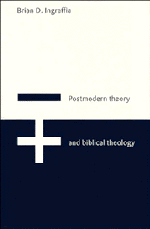Book contents
- Frontmatter
- Contents
- Acknowledgements
- List of abbreviations
- Note on translations of the Bible
- Introduction: postmodernism, ontotheology, and Christianity
- 1 NIETZSCHE'S MOCKERY: THE REJECTION OF TRANSCENDENCE
- 1 The death of God: loss of belief in the Christian God as the cause of nihilism
- 2 Vanquishing God's realm: Nietzsche's abolition of the true world
- 3 Nietzsche on the Judaeo-Christian denial of the world
- 4 The redemptive–eschatological separation between the present world and the world to come in the New Testament
- 5 On redemption: the eternal return or biblical eschatology
- II HEIDEGGER'S FORGETTING: THE SECULARIZATION OF BIBLICAL ANTHROPOLOGY
- III DERRIDA'S DENIALS: THE DECONSTRUCTION OF ONTOTHEOLOGY
- Conclusion: ontotheology, negative theology, and the theology of the cross
- Notes
- Bibliography
- Index
5 - On redemption: the eternal return or biblical eschatology
Published online by Cambridge University Press: 01 June 2011
- Frontmatter
- Contents
- Acknowledgements
- List of abbreviations
- Note on translations of the Bible
- Introduction: postmodernism, ontotheology, and Christianity
- 1 NIETZSCHE'S MOCKERY: THE REJECTION OF TRANSCENDENCE
- 1 The death of God: loss of belief in the Christian God as the cause of nihilism
- 2 Vanquishing God's realm: Nietzsche's abolition of the true world
- 3 Nietzsche on the Judaeo-Christian denial of the world
- 4 The redemptive–eschatological separation between the present world and the world to come in the New Testament
- 5 On redemption: the eternal return or biblical eschatology
- II HEIDEGGER'S FORGETTING: THE SECULARIZATION OF BIBLICAL ANTHROPOLOGY
- III DERRIDA'S DENIALS: THE DECONSTRUCTION OF ONTOTHEOLOGY
- Conclusion: ontotheology, negative theology, and the theology of the cross
- Notes
- Bibliography
- Index
Summary
“Whither is God?” he cried; “I will tell you. We have killed him – you and I. All of us are his murderers … God is dead. God remains dead. And we have killed him … What was holiest and mightiest of all that the world has yet owned has bled to death under our knives: who will wipe this blood off us? What water is there for us to clean ourselves? What festivals of atonement…? Must we ourselves not become gods simply to appear worthy of it?”
Nietzsche, The Gay ScienceYou disowned the Holy and Righteous One and asked that a murderer be released to you. You killed the author of life, but God raised him from the dead … Repent, then, and turn to God, so that your sins may be wiped out.
Peter in Acts 3:14–15, 19Nietzsche presents his own gospel, his counter-gospel, in Thus Spoke Zarathustra. Just as readings of Nietzsche's philosophy have emphasized Nietzsche's opposition to metaphysics, so have readings of Nietzsche's narrative focused upon parodies of Socrates/Plato. Kathleen Higgins writes that “neither the parody of the New Testament nor that of the Platonic dialogues ultimately proves to be the more dominant parody.” The best recent work on Zarathustra, Laurence Lampert's Nietzsche's Teaching, while doing a thorough job of mentioning parodies of the Bible and noting allusions, focuses upon Nietzsche's attack on Socratic rationalism.
- Type
- Chapter
- Information
- Postmodern Theory and Biblical TheologyVanquishing God's Shadow, pp. 88 - 98Publisher: Cambridge University PressPrint publication year: 1995



